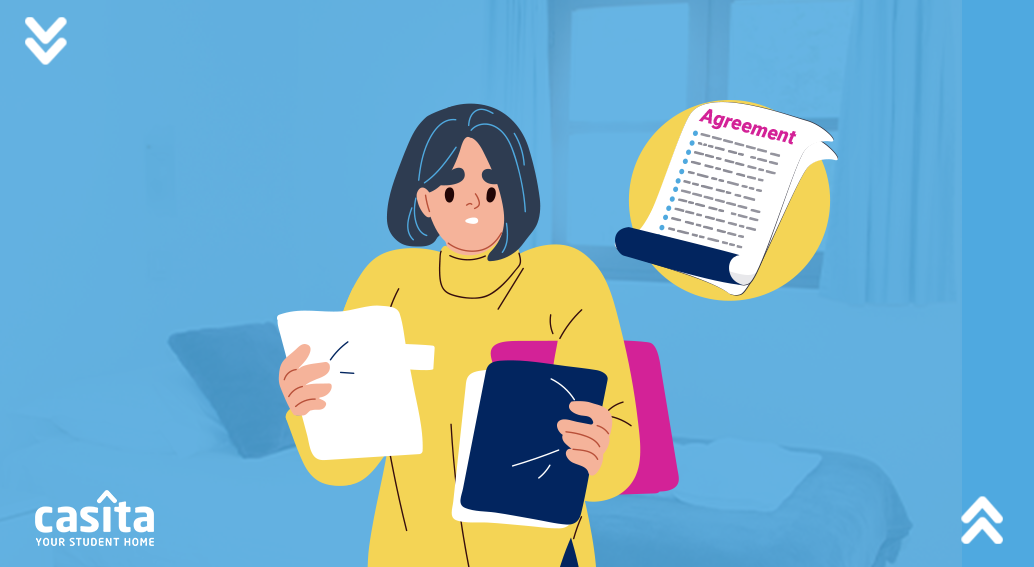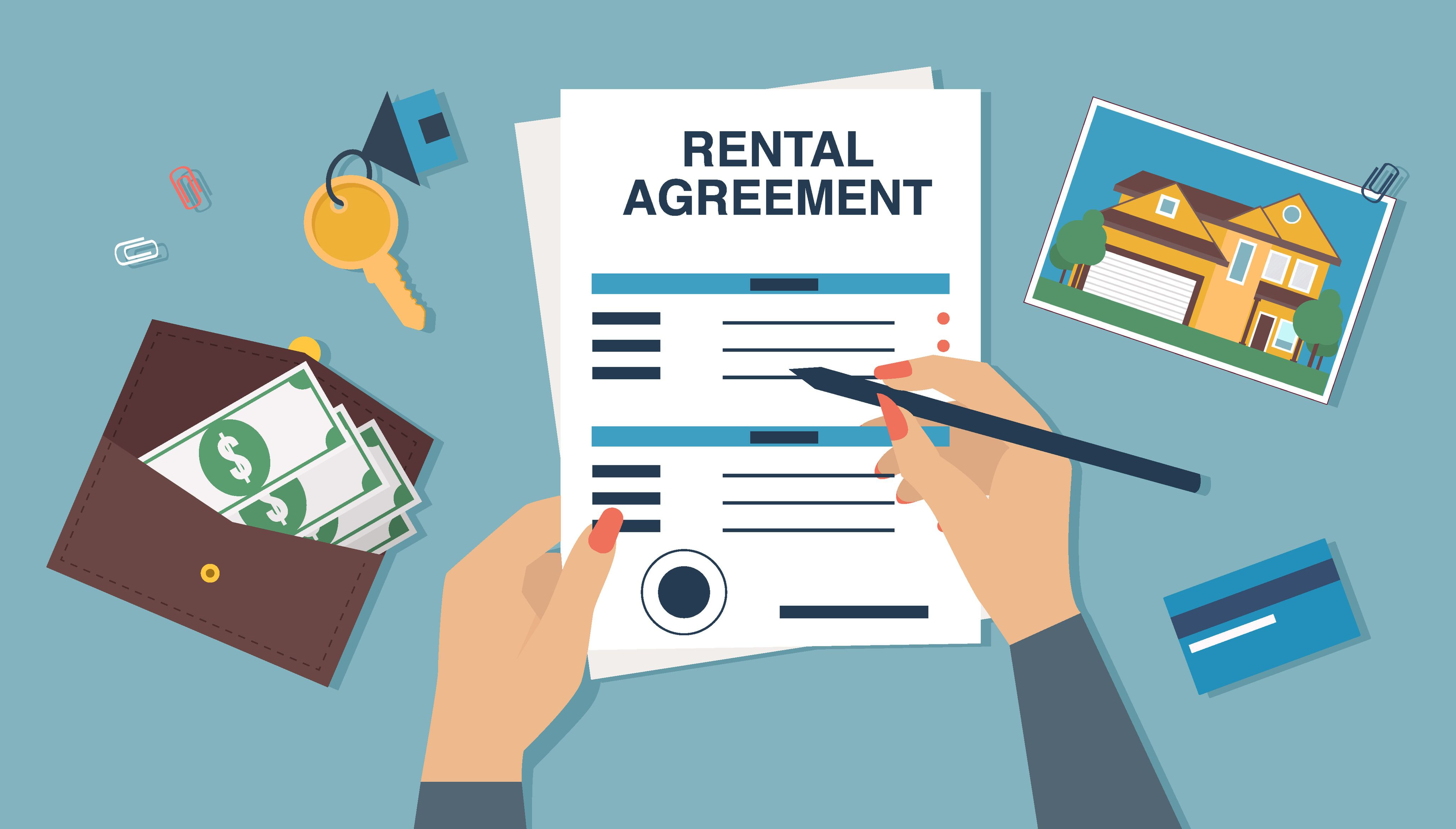Things to Check Before Signing a Tenancy Agreement
Student Housing
Tips and Advice
6 mins read
Share

Updated at: 25 November, 2025
Published at: 27 November, 2022
By Reem Mohamed
Things to Check Before Signing a Tenancy Agreement
Student Housing
Tips and Advice
6 mins read

Updated at: 25 November, 2025
Published at: 27 November, 2022
By Reem Mohamed
Share
Finding the perfect student accommodation can be a hassle, but do not let that or the joy of finally securing your dream student home distract you from checking your tenancy agreement before signing it. Signing a tenancy agreement is what stands between you and your perfect student accommodation. So, it’s crucial you know what to look for in one and what to avoid.
In order to avoid being scammed, robbed, or paying a lot for so little, you need to learn the workings of a tenancy agreement. Say this is your first time signing a tenancy agreement and you’re worried about not getting it right or falling victim to some sort of scam, worry not, we’ve got you covered! Let us walk you through the most important things to check before signing a tenancy agreement!

1. Contract Type
When it comes to student homes, the contract type is most likely an Assured Shorthold Tenancy Agreement, which lasts 12 months, usually from July 1st to June 30th. If your contract isn’t that of a student home, then there are two possibilities, an Individual Contract or a Joint Tenancy Agreement.
Individual Contracts, which are the more desirable type of contract, are agreements between each individual tenant and the landlord. What does that mean? Well, it simply means that if more than one person lives together and one of them wants to end the agreement and move out, the rest of the tenants will not be expected or liable to cover for them. This is the type of tenancy you should go for if available.
In a Joint Tenancy Agreement, however, the whole group of tenants are held accountable for the property and the rent payments. What that means is that if a group of tenants live together and one of them decides to leave, the rest will be asked to leave as well, that is unless they make some kind of agreement with the landlord.
2. Deposit Schemes
An important thing to check for when signing a tenancy agreement is the deposit. A month’s rent or sometimes up to five weeks’ rent is required to be paid after signing a tenancy agreement and prior to your tenancy actually starting. This deposit acts as some sort of safety net for the landlord in case of late rent payments or damage to the property.
Before committing to any payments, you should know what you’re paying and whether it’s protected throughout your full tenancy. A deposit should not be paid before signing the tenancy agreement unless it’s a holding deposit, which is a special case and the only one to be paid prior to signing the tenancy agreement.
According to the law in the UK, all deposits taken by landlords must be registered with a government-backed deposit protection scheme within 30 days. You should check that your landlord is both part of a scheme and has also submitted your deposit to be protected. Here are the approved schemes across UK countries: England, Scotland, Wales, and Northern Ireland.
England and Wales: Tenancy Deposit Scheme (TDS), The Deposit Protection Service (DPS), and mydeposits.
Northern Ireland: mydeposits Northern Ireland, Letting Protection Service NI (LPS), and Tenancy Deposit Scheme Northern Ireland (TDS).
Scotland: Safe Deposits Scotland, mydeposits Scotland, and Letting Protection Service Scotland (LPS).
In case of concerns about your landlord’s legitimacy and whether or not they’re abiding by the rules, you can if the property is on record with the aforementioned schemes. If not, then not only is your landlord breaking the law, but you are also entitled to compensation that is potentially up to three times your deposit.

3. Fine Print
When signing any contract or agreement, it is always crucial to check the fine print. We know they can be lengthy and boring to read, but reading the fine print can save you a lot of future hassle. Here are some of the major points you should look out for when reading a tenancy agreement.
Check the start and end date of your tenancy.
Check the names of every tenant as well as the landlord.
Read over your obligations (what you are allowed and not allowed to do during your stay) thoroughly and make sure you agree before signing.
Check the rent and any hidden fees and who’s liable to pay.
Check if your agreement allows for the general wear and tear of the property.
Check for any repairs you might require your landlord to take care of before you move in.
Go over the contract a few times thoroughly and do not hesitate to ask if something looks off to you or if you need some clarification. And remember that if your landlord has agreed to repair or purchase something (while you were viewing) then make sure you get that in writing so it gets done. If you don't get it in the contract, it's harder to prove that your landlord agreed to do it, and thus harder for it to get it done.
4. Rent Negotiations
Always have a proper discussion about the rent with your landlord. At the end of the day, you are a customer and they need you, so do not hesitate to negotiate the rent if you think you should pay a lower amount. Having said that, try not to go for properties where you’re not sure you can afford the full rent throughout the duration of your tenancy.
5. Guarantors
Most landlords will require you to have a guarantor as reassurance that your rent will still be paid in case you can’t keep up with it. A guarantor is simply someone, mostly a parent or a guardian, who will, in the worst-case scenario, pay your rent if you can't make the payments.
The landlord has to be able to easily reach the guarantor, because if not, the guarantor can be taken to court, so make sure you don’t miss a payment and if you do, make sure your guarantor is reachable.
Guarantors are not required to be there in person to sign the contract; however, they will be asked to sign a copy and send it back with proof of identity (usually just a passport photocopy) as well as proof of address.
6. Summer Holiday
Whatever your plans for the summer may be, do not forget that most, if not all, landlords will expect at least half rent during July and August if you want to secure a place. If the house isn’t in high demand, you may not be asked to pay this retainer. However, you need to be sure and decide whether or not this is a risk worth taking.
Whatever you end up deciding, be sure that you check the contract carefully and thoroughly. Check for clauses on summer holiday and see if it mentions that you cannot live in the property during the summer period due to repair work, or that if you do, you may be liable to pay full rent, even if there are only one or two tenants present. It’s important to be prepared beforehand!
7. Inventory
This is an important one to check as it decided what furniture or house essentials you’re bringing and what’s already provided by the landlord. Inventory also helps you check whether anything is wrong with the house and needs to be repaired by the landlord before you move in. Inventory essentially ensures that tenants aren't charged for any damage that was already present before they moved in and avoids any arguments about broken or missing furniture from the house.
The inventory is signed by both parties, so make sure you go over it with care and pay it much attention. At the end of the tenancy period, the house is checked against the signed inventory, and the deposit is paid back to you accordingly.
Do not be scared to ask for your landlord to be there during the inventory process. Having them around to talk things through and witness the process first-hand will prevent any future disputes or disagreements. The inventory can be carried out by an independent company, which is in your favour as it is an unbiased third party and will do an honest evaluation.
You might also want to consider taking your own pictures of the rooms and making notes of any faults, as well as taking a photocopy of the inventory. This is to provide you with extra evidence in case of any claims against you at the end of the tenancy.
These are some of the basic things to look out for before signing a tenancy agreement. Use this as your guide or your checklist to bring with you on the day of. Negotiate your rent, do not forget the fine print, and in the event you have trouble dealing with your landlord after you move in, check out our guide on the matter!
Student Housing
Tips and Advice
By Reem Mohamed
Share
Student Housing
Tips and Advice
Updated at:
Published at:
By Reem Mohamed
Share

